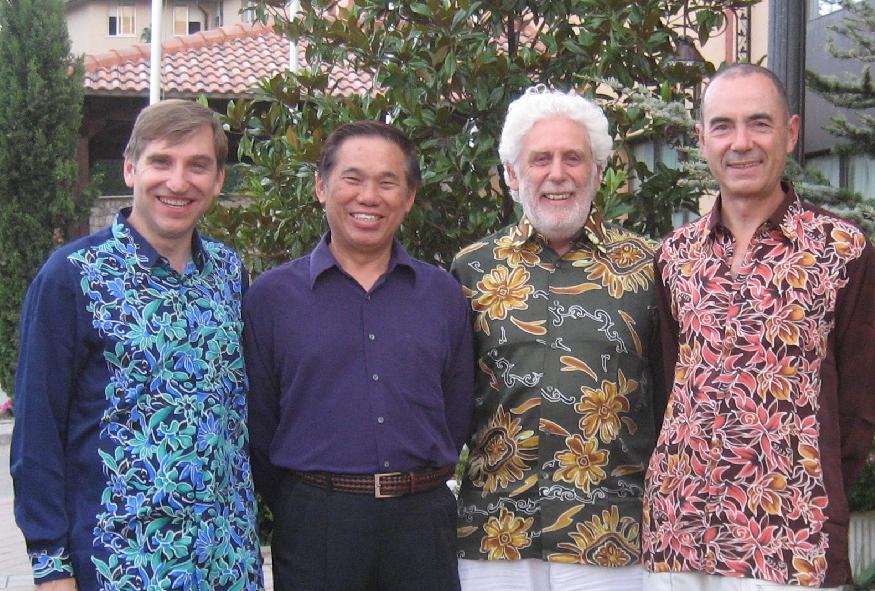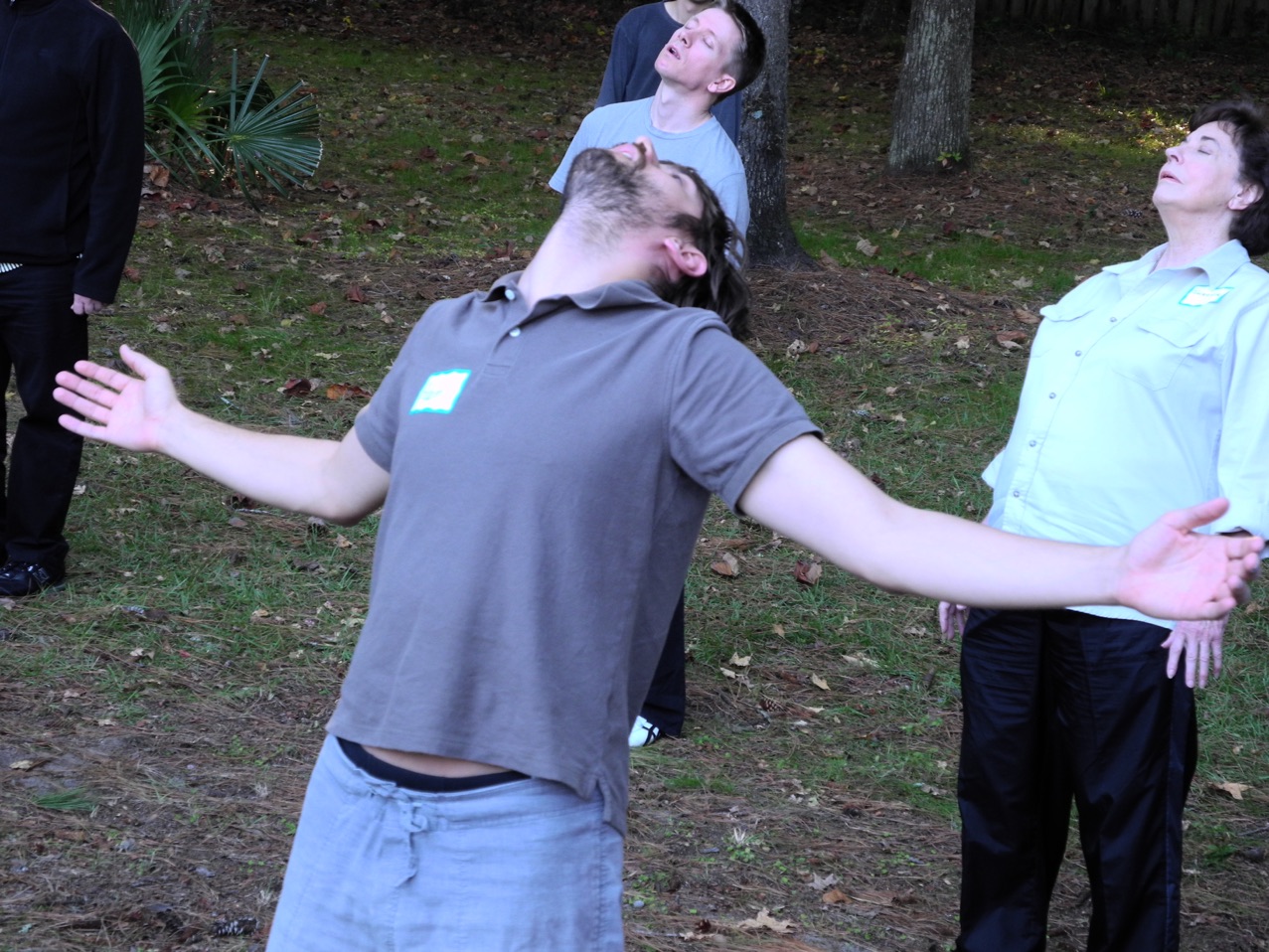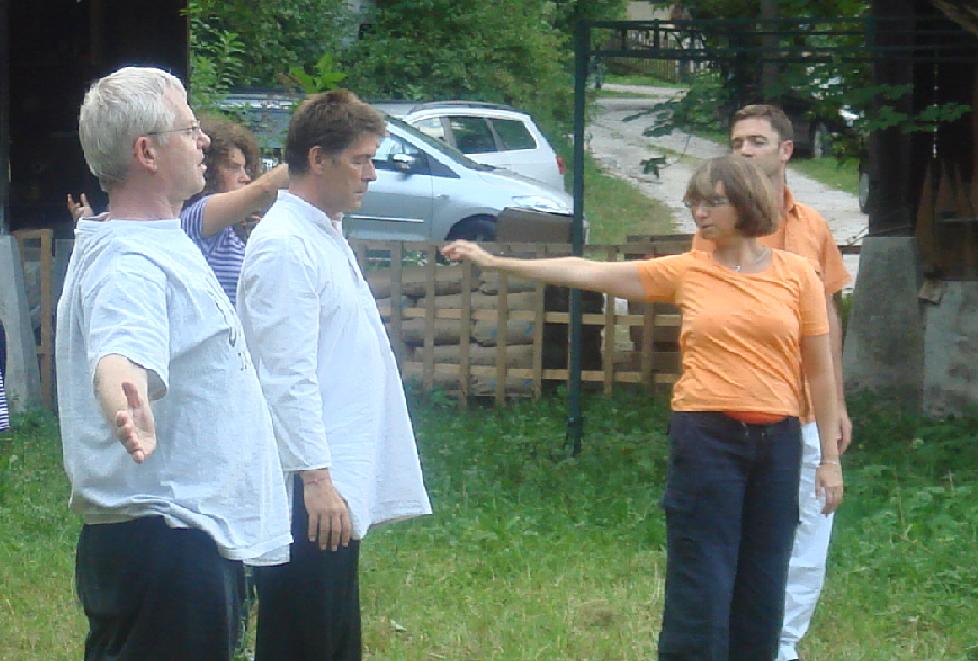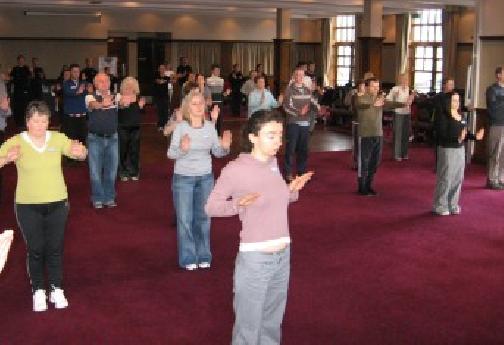DECEMBER 2009 (Part 1)
SELECTION OF QUESTIONS AND ANSWERS

The basic benefit of spiritual cultivation is to be peaceful and happy, as seen in Grandmaster Wong and his disciples in the picture here. From left: Dr Francis, Grandmaster Wong, Dr Riccardo and Dr Inaki.
Question 1
I have been fortunate enough to learn high-level chi kung from a qualified friend and instructor the past 18 months. I have experienced tremendous health benefits such as a greatly improved immune system, beautiful smile and radiant face, and an overall feeling of happiness.
— Joe, USA
Answer
Congratulations for the good results. Being able to learn and practice high-level chi kung like you do, is a rare opportunity.
Question 2
I respect my friend very much and feel lucky to have learned chi kung from him. With that said, I have noticed that I do not necessarily agree with everything my friend says. He has encouraged me to seek spiritual cultivation through chi kung practice and has spoken a lot about Buddhism and Taoism in his lectures. When he mentions religion, I get scared and it has affected my chi kung practice to the point that I have had to take breaks and stop doing my chi kung completely.
Answer
Although your friend certainly means well, you are perfectly right not to necessarily agree with everything he says. This is especially so with religion.
But you need not have to be scared. Chi kung is categorically non-religious. You can still continue to practice the chi kung he has taught you and enjoy the benefits without following his religious suggestions.
Be assured that no harm will come to you even you do not accept his religious suggestions but continue to practice the chi kung he has kindly taught you. This is because his religious suggestions and his chi kung teaching are two separate issues. Suppose another teacher who professes a different religion or who has no religion were to teach you the same type of chi kung, and you had practiced it the same way, you would have the same good results.

Chi kung is spiritual but not religions. Course participants enjoyed a spiritual experience during a chi kung course.
Question 3
In your Q&A, you mention practicing chi kung for developing internal energy for good health and spiritual cultivation. I do agree with your statement about practicing chi kung for internal energy, but I am unsure what you mean by spiritual cultivation. Does spiritual cultivation in chi kung mean the Buddhist way of spiritual cultivation?
Answer
Firstly, I would like to clarify that spiritual cultivation is not the same as religious cultivation. In other words, a person while cultivating spiritually can choose to follow a particular religion or not to follow any religion at all.
Spiritual cultivation refers to the cultivation of the spirit, not just the physical body or the energy that works the body. At the basic level, a spiritually cultivated person is peaceful and happy. At the advanced level, he has and demonstrates cosmic wisdom. He may, for example, experience that his spirit literally expands beyond his physical body.
A spiritual person is often religious, but not necessarily so. On the other hand, unfortunately some persons may have attained high spiritual cultivation yet remain evil. Black magicians are an example. They have spiritual powers but use them for evil purposes.
Western psychics are another example of persons with high spiritual attainment. The term "psychi" means spirit. Psychic powers are spiritual powers, i.e. powers derived from cultivating the spirit. Many Western psychics are not particularly religious.
Spiritual cultivation in chi kung does not necessarily mean the Buddhist or the Taoist or any particular religious way of cultivation. It relates but does not conform to the religion or lack of it the chi kung practitioner professes. If he is a Christian or a Muslim, for example, his spiritual cultivation in chi kung is not necessarily the Christian way or the Muslim way of spiritual cultivation, but he will become a more devoted Christian or Muslim because it enables his Christian or Muslim spiritual teachings to come alive.
As an analogy, the physical cultivation of an external martial artist is not the same as the physical cultivation of a footballer or a dancer. But if the external martial artist is a footballer or a dancer, his physical cultivation as a martial artist will enable him to be a better footballer or a better dancer because it enhances the physical qualities of football or dancing.
Question 4
I believe that being a good person in life is good enough, and I do not necessarily believe in adhering to a specific religion - regardless of which religion it is. Can I develop my chi kung without getting into a specific religion or religions?
Answer
You certainly can.
Nevertheless, although you do not have any need for a particular religion now, it is worthwhile to have an objective understanding of the world's great religions.
As chi kung is spiritual, but not religious, your practice of high-level chi kung will one day lead you to a stage of spiritual development when a comparative understanding of various great religions will act like a map to show you routes and destinations that you may choose to pursue. But if you do not wish to pursue any of these routes or reach any of these destinations even when you have arrived at this stage of development, you can still throw away the map.

Students at a chi kung course in Austria practicing "Big Windmill"
Question 5
I respect all religions in the world, and I believe that all religions have good messages in them. But personally, I do not like the idea of labeling myself as a Christian, Buddhist, Islamic, Taoist, etc. Can I develop my chi kung for internal energy for good health and longevity and gain a sense of happiness without getting into a specific religion or religions?
Answer
Again, you definitely can. In fact most schools of chi kung will arrive at a destination described by you, i.e. attaining good health, longevity and happiness. Only a few elite schools of chi kung will break through this mundane level to the supra-mundane. This is where a comparative understanding of the world's great religions will be very helpful.
This does not mean you have to follow the teachings of these great religions if you do not wish to. But it is only wise to listen with an open mind what the greatest teachers the world has produced have to say about the supra-mundane. You are still free to choose to accept or reject their teachings. But you will certainly make a better choice when you have access to their cosmic wisdom.
Question 6
In "Plucking Stars" I breathe in while I am raising the hands and visualize cosmic energy filling my abdomen and breathe out while lowering the hands and feel cosmic energy flowing into my hands. Is it OK?
— Dr Vikas, India
Answer
In "Plucking Stars", you should breathe out gently while your hands are being extended, i.e. one hand is going up and the other hand is going down, and breathe in gently while your bands are coming together like holding a ball of energy at your abdominal level.
While you breathe out as you extend your hands, you may visualize energy flowing to your hands and legs. While you breathe in as you bring your hands together, you may visualize energy flowing to your abdomen.
But don't worry if you have performed the exercise using a different breathing pattern. There can be variations in the breathing, and if you have good results, you need not worry whether you did the exercise wrongly.

Students at a chi kung course in Ireland practicing "Pushing Mountain"
Question 7
In "Big Windmil" while breathing out do I need to visualize anything?
Answer
Again there are variations in performing the exercise. You may perform the exercise gently focusing on your breathing without worrying about any visualization, or you may add some gentle visualization.
There are also variations in the visualization. You may, for example, gently visualize energy flowing to your hands as your breathe out, or energy flowing to your abdomen as you breathe in.
But if you are practicing on your own without the supervision of a master, I would suggest that you just gently focus on your breathing and leave out the visualization. You can trust my words as a chi kung grandmaster that if you just gently focus on your breathing and enjoy it, you will get much more benefits than using any visualization. More significantly, leaving out the visualization will make your practice much safer.
Question 8
In "Merry-Go-Round" visualization of energy flowing into skeletal framework should be done in which phase of breathing or it doesn't matter?
Answer
It may come as a surprise to many people that the visualization can be done while breathing in or while breathing out. So, does it matter whether it is during the in breath or the out breath?
The answer is yes and no. Generally it does not matter, provided the exercise, especially the breathing and how the visualization is being done, is performed correctly. But for special situations or for fine details, there are differences.
But, irrespective of when the visualization is being carried out, it does matter very much that the exercise should be performed correctly. By performing the exercise correctly, I am not just referring to the physical movements of the exercise, but more importantly both the breathing and the visualization must be gentle. It is mainly for this very reason -- that students without a master's supervision are likely to make mistakes in breathing and visualization -- that most of the chi kung exercises taught to the public are without these two internal aspects.
Question 9
Apart from mild colitis (probably quiescent presently) and gastritis I have a tendency to develop muscle spasms especially in left lower back (mild sciatica), left lower ribcage, left side of neck and left diaphragm. Would the above exercise remedy that also? Should I do the "Pushing Mountains" exercise also?
Answer
It may appear ridiculous from a Western medical perspective, but from the traditional Chinese medical perspective if your energy flow is harmonious, you will have yin-yang harmony, which means you will not have any health problems.
"Harmonious energy flow" is a Chinese medical jargon. In everyday language it means vital energy flows smoothly to all your cells, all your tissues, all your organs and all your systems to enable them to perform the work they are supposed to do, including repairing damaged cells and tissues, clearing away toxic waste, disease-casuing agents and negative emotions, and ensuring the healthy functioning of metabolic processess.
Practicing chi kung is an excellent way to generate this energy flow. However, the energy flow generated by low-level chi kung may be too weak or too slow, and thus may not be effective in overcome more serious diseases.
In your case, the health problems are mild. If you continue practicing daily what you have been doing, you should be able to overcome these problems, including colitis, gastritis and muscle spasms.
Yes, it is good to do "Pushing Mountain" too. It is a very effective exercise to increase the force of the energy flow.
But the crucial point is not what exercises you practice but how you practice them. If you perform them as physical exercise, they are unlikely to help you overcome your health problems. If you perform them as chi kung, it is very likely that your health problems will soon go away.
The crucial difference between physical exercise and chi kung is energy flow. Energy flow is not generated in physical exercise. In fact you complete any physical exercise with less energy than when you started. Energy flow is generated in chi kung, You have more energy at the end of a chi kung exercise than at the beginning.
If you have the opportunity, I would recommend that you attend my Intensive Chi Kung Course. You will be amazed at what you can learn at the course. You will learn skills and techniques that will enable you not only to have good health, vitality and longevity but also mental clarity and spiritual joys. Please see Intensive Chi Kung Course for details.
LINKS
Selected Reading
- Capturing Green and Sharing Prosperity
- From Specific Techniques to Free Sparring
- Kungfu Sets and their Movements
- Chi Kung and Academic Excellence
- Sifu Wong's Skills, Teaching Method and Personality
